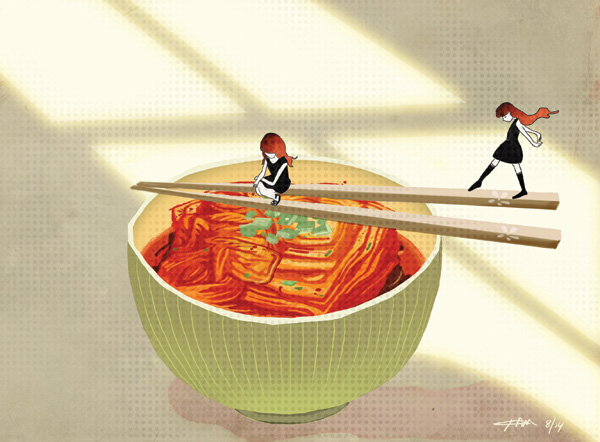story and illustration by KAM REDLAWSK
I think every one of us can immediately list foods that remind us of our childhood, the foods that give us comfort and feel like home. But how about foods that revive a childhood that we can’t seem to remember? When I boarded the plane to my new American life, in 1983, I not only left my foster mother, my orphanage and all that I knew for four years, but my home country and its culture.
Growing up in the suburbs of Michigan, with very Caucasian surroundings, I underwent the process that any foreigner goes through to assimilate and survive in her new life. I began learning my new family’s culture, and soon enough the memories of my birth country began to dissolve. I began to forget that I was Korean and had come from very different beginnings. It was almost like I folded the memories neatly and tucked them in a back drawer, opening them only now and then.
One summer when I was 12 years old, my family took a summer road trip to Kentucky to meet my father’s friend, whom he had served alongside in Desert Storm. His wife, Suk, happened to be South Korean, and they had two sons. We spent a week with their family, and I always remember the trip very fondly. One day, Suk took my mother and me to a commissary that happened to sell some Korean foods, such as ramen and kimchi. I was flabbergasted to see all the different kinds of spicy ramens in the aisle. Up until then I thought ramen only came in chicken flavor.
When we arrived back at her house with a bag full of groceries, Suk seemed excited to introduce me to some humble Korean treats. I remember standing on her linoleum kitchen floor as she reached into the fridge and took out a gigantic jar of what looked like brains to me. She told me it was spicy cabbage, a staple of Korean cuisine. “Wow,” I thought, “it looks gross.”
Suk set up a traditional, low Korean table on the floor and cooked up a very simple ramen dish with an egg, a bowl of steamed rice, some seaweed wraps and the kimchi. I felt new to the experience, but excited. I could tell Suk was excited, too, to share some of the foods that I seemed to have forgotten. As I took in a waft of the kimchi, it smelled garlicky and a bit rancid. I took a bite, and it was crunchy, yet soft in texture. Despite how smelly it was, I was in love with kimchi from the first bite. I remember eating some rice with the kimchi, and even the rice was different than what I had throughout my American life. It was stickier. I sat at the Korean table scarfing down the Korean edibles, and somehow I felt connected to a part of my old self. And, it felt familiar. Kimchi felt familiar.
The experience made me realize that our sense of smell and taste are extremely potent. Perhaps the olfactory and gustatory memory is even more reliable than our other memories because the latter often gets distorted by its owners. But our smell- and taste-based memories seem more pure, reminding us of something good or even something bad.
We all have these stories, stories of the foods that instantly give us that feeling of “home.” For me, this bowl of kimchi triggered some internal whisper that brought me back to my earliest, yet seemingly forgotten days. “Ahhh, I remember you,” the voice said. “Where have you been?”
___
Kam Redlawsk’s column runs every other month. To read more from Kam, visit her website or Facebook page.
This article was published in the October/November 2014 issue of KoreAm under the title “Kimchi Nostalgia” Subscribe today! To purchase a single issue copy of the magazine issue, click the “Buy Now” button below. (U.S. customers only. Expect delivery in 5-7 business days).







